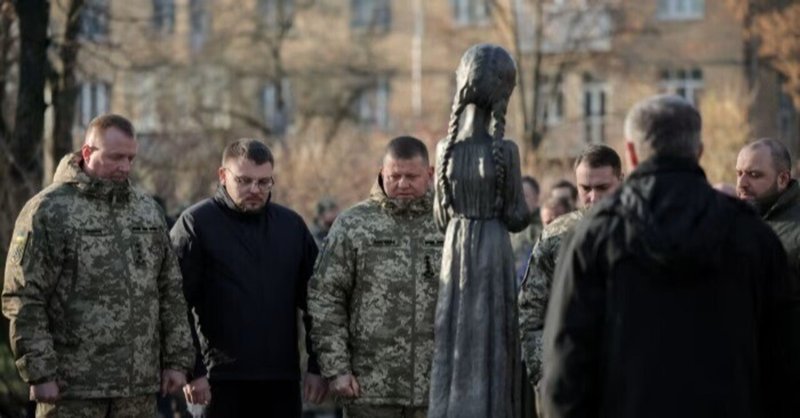
ウクライナ人、ヴォロディミル・ゼレンスキーの「バラ色」演説に疑問を呈す/FTを読む
Ukrainians question Volodymyr Zelenskyy’s ‘rose-tinted’ speeches
ウクライナ人、ヴォロディミル・ゼレンスキーの「バラ色」演説に疑問を呈す
Former and current advisers say lack of realism in president’s messaging is undermining confidence
元および現顧問らは、大統領のメッセージに現実性が欠けていることが信頼を損なっていると語る
For more than 650 days in a row, Ukrainian President Volodymyr Zelenskyy has given at least one video address to the nation — praising his troops, celebrating advances along the front lines and reaffirming resolve in the face of Russian aggression.
650日以上連続で、ウクライナのウォロディミル・ゼレンスキー大統領は国民に少なくとも1回ビデオ演説を行っており、軍隊を称賛し、前線での前進を祝い、ロシアの侵略に直面した決意を再確認している。
The message is always “we’re moving forward”, with the aim of maintaining optimism at home and abroad, according to three people familiar with the communications strategy. The policy is applied at all state levels, from ministries and local administrations to military commanders and includes strict censorship of bad news such as Ukrainian casualty numbers or successful Russian strikes.
コミュニケーション戦略に詳しい関係者3人によると、メッセージは常に「私たちは前進している」であり、国内外で楽観的な見方を維持することを目的としているという。 この政策は省庁や地方行政から軍司令官に至るすべての州レベルに適用され、ウクライナの死傷者数やロシアの攻撃成功などの悪いニュースに対する厳格な検閲が含まれている。
But with Ukraine enjoying few military achievements this year and western support faltering, the communications strategy is creating a rift between the presidential administration and military leadership, say officials from the armed forces, former presidential staffers and communication strategists.
しかし、ウクライナは今年ほとんど軍事的成果を上げておらず、西側諸国の支持も低迷しているため、コミュニケーション戦略が大統領政権と軍指導部の間に亀裂を生み出していると国軍関係者や元大統領スタッフ、コミュニケーション戦略家らは述べている。
“We need to add more realism . . . and we have to be as courageous about it as we were on February 24 [2022],” said a person connected to the presidential communications strategy in reference to the day Russia began its full-scale invasion of Ukraine.
「もっとリアリズムを加える必要があります. . . [2022年]2月24日のときと同じくらい勇気を出して対応しなければならない」と大統領広報戦略関係者は、ロシアがウクライナへの本格的な侵攻を開始した日に関して語った。
Political rivals have begun to openly criticise Zelenskyy, with Kyiv mayor Vitali Klitschko recently accusing the president of authoritarianism and even comparing him to Russian leader Vladimir Putin.
政敵たちはゼレンシキー氏を公然と批判し始めており、キエフ市長のヴィタリ・クリチコ氏は最近、大統領を権威主義だと非難し、ロシアの指導者ウラジーミル・プーチン氏とさえ比較した。
Meanwhile, military leaders have argued that the gap between official messaging and the situation on the ground is no longer convincing, and therefore not motivating Ukrainians or the country’s western partners.
一方、軍指導者らは、公式メッセージと現地の状況との間のギャップはもはや説得力を持たず、したがってウクライナ人や同国の西側諸国のパートナーを動かすことはできないと主張している。
But Zelenskyy sees an optimistic message as the only way to reassure Ukraine doubters in the west and shore up the confidence of Ukrainian businesses, a vital source of tax revenues for the war effort.
しかしゼレンシキー氏は、西側のウクライナ懐疑派を安心させ、戦争遂行に不可欠な税収源であるウクライナ企業の信頼を高めるには、楽観的なメッセージが唯一の方法だと考えている。
“If we are pessimistic, we can expect [people] to stop developing their businesses in Ukraine and stop paying taxes, and we will not have enough money to keep fighting,” said an official.
「悲観的になれば、(人々が)ウクライナでの事業展開をやめ、納税をやめることが予想され、戦い続けるための十分な資金がなくなるだろう」と当局者は語った。
The differences burst into the open last month, when Ukraine’s top general Valeriy Zaluzhnyi told The Economist that the land war was at a “stalemate” — a taboo word in Kyiv, despite the fact the front lines in eastern Ukraine have barely moved since the country’s counteroffensive began in June.
先月、ウクライナトップのヴァレリー・ザルジニ将軍が『エコノミスト』誌に対し、ウクライナ東部の前線が6月の反攻開始以来ほとんど動いていないにもかかわらず、陸上戦は「膠着状態」にあると、キエフではタブー視されている言葉を口にしたことで、この相違が露わになった。
Zaluzhnyi’s candour surprised many Ukrainians, and some western leaders even called Kyiv to ask what it meant and whether negotiations were now a priority, according to the official.
ザルジニ氏の率直な態度は多くのウクライナ人を驚かせ、西側の指導者の中にはキエフに電話をかけて、どういう意味なのか、今交渉が優先されるのか、と尋ねた者もいたという。
Iryna Zolotar, adviser and head of communications for Ukraine’s former defence minister Oleksii Reznikov, said the optimism strategy initially worked, helping Ukrainians believe in themselves and their ability to resist the invasion.
ウクライナのオレクシイ・レズニコフ元国防相の顧問兼広報責任者であるイリーナ・ゾロタル氏は、楽観的戦略は当初はうまくいき、ウクライナ人は自分たちの力と侵略に抵抗する力を信じることができたと述べた。
But it had now created a confusing narrative where “expectations are overstated and do not correspond to the real state of affairs”, Zolotar said. Media articles describing things as “not as good” as the official line were viewed as false, she said. Instead, the government needed to demonstrate “balanced realism”.
しかし、その結果、「期待が誇張され、現実の状況とは一致しない」混乱した物語が生まれた、とゾロタルは言う。メディアの記事は、公式見解ほど「良いものではない」と記述しているが、それは虚偽であると彼女は言った。その代わりに、政府は「バランスの取れた現実主義」を示す必要がある。
“In order for society not to build castles in the air, and to take off its rose-tinted glasses . . . it is necessary to stop being afraid to speak the truth,” she said. “That victory will come with difficulty, that it is a marathon and is long and exhausting.”
「社会が空中に城を建てず、バラ色の眼鏡を外すために. . . 真実を話すことを恐れるのをやめる必要がある」と彼女は語った。 「その勝利には困難が伴います。それはマラソンであり、長くて疲れるものです。」
Zolotar said the current strategy had left audiences in the west asking why they should contribute their taxpayers’ money if Ukraine was always “about to win”.
ゾロタール氏は、現在の戦略は西側諸国の視聴者に、ウクライナが常に「勝利しようとしている」のであれば、なぜ自分たちの税金を拠出する必要があるのか、と疑問を抱いていると述べた。
Other communications advisers say the strategy shields Ukrainians and western public opinion from the urgency of the situation and undermines trust.
他の広報アドバイザーによれば、この戦略はウクライナ人や西側世論を事態の緊急性から遠ざけ、信頼を損なうものだという。
“Sometimes the fight — communicating what’s happening in real life — tells more than just a beautiful photo of the fight,” said one former senior staffer.
「時には、戦いは、実際に起こっていることを伝えることで、単なる戦いの美しい写真以上のことを伝えます」と、ある元上級スタッフは語った。
An example was Ukraine’s frequent use of “counterpropaganda” during the 10-month battle for the east Ukrainian town of Bakhmut, the former staffer said. This mirrored Russian tactics in trying to maintain an image of success, while western partners were telling Kyiv that Bakhmut was not worth the enormous losses.
その一例は、ウクライナ東部の町バフムートをめぐる10か月にわたる戦闘中に、ウクライナが頻繁に「反プロパガンダ」を使用したことだと元職員は語った。 これは成功のイメージを維持しようとするロシアの戦術を反映しており、西側諸国のパートナーはバフムートには巨額の損失を支払う価値がないとキエフに伝えていた。
Official channels on Telegram and other social media branded the fight with slogans such as “Fortress Bakhmut” and “unbreakable” Bakhmut — which disappeared in the days before Russia declared victory in May. Zelenskyy never officially acknowledged Ukraine’s retreat from Bakhmut, and in June the defence ministry presented continued Ukrainian attacks from the edge of the town as evidence it had not lost the battle.
テレグラムやその他のソーシャルメディアの公式チャンネルは、「バフムート要塞」や「不屈のバフムート」などのスローガンでこの戦いをブランド化したが、5月にロシアが勝利を宣言する数日前には消えていた。 ゼレンスキー大統領は、ウクライナがバフムトから撤退したことを公式には認めなかったが、6月に国防省は、ウクライナが戦いに負けていない証拠として、町外れからの継続的なウクライナの攻撃を提示した。
The communications package covered up “the incredible levels of exhaustion, the suffering of thousands of families, enormous numbers of daily deaths, the tension and doubt”, said the former staffer. By glossing over bad news, the view from abroad was of “two propagandists fighting propaganda narratives”.
通信パッケージは、「信じられないほどのレベルの疲労、何千もの家族の苦しみ、毎日発生する膨大な数の死、緊張と疑念」を覆い隠していた、と元スタッフは言う。悪いニュースを覆い隠すことで、海外からは「2人のプロパガンダ担当者がプロパガンダのナレーションを戦わせている」という見方がされた。
News about the war seeped through to the Ukrainian public via social media and word-of-mouth despite censorship, said Oksana Romaniuk, director at Ukraine’s Institute for Mass Information, a media monitoring organisation.
メディア監視組織であるウクライナマス情報研究所所長のオクサナ・ロマニウク氏は、戦争に関するニュースは検閲にもかかわらず、ソーシャルメディアや口コミを通じてウクライナ国民に浸透したと述べた。
“Almost everybody in Ukraine has relatives or friends fighting or who have suffered directly from the war,” said Romaniuk. “If there is no negative information, it will kill the trust towards the government.”
「ウクライナのほぼ全員に、戦争をしている親戚や友人がいる、あるいは戦争で直接被害を受けた人がいる」とロマニウク氏は語った。 「ネガティブな情報がなければ政府への信頼が失われる」
Romaniuk pointed to shrinking audiences for Ukraine’s national “Telethon” — government-approved news bulletins broadcast by the main channels — as well as a recent poll by the US-based International Republican Institute that showed declining support for Zelenskyy.
ロマニウク氏は、ウクライナ国内の「テレソン」(主要放送局が放送する政府公認のニュース速報)の視聴者が減少していることと、米国に本拠を置く国際共和党協会による最近の世論調査でゼレンシキー氏への支持が低下していることを指摘した。
Maryna Brylova, a 61-year-old Ukrainian language lecturer, said she had not watched the Telethon since the first days of the invasion but understood the president’s need to galvanise the nation.
61歳のウクライナ語講師マリーナ・ブリロワさんは、侵略の最初の日以来テレソンを見ていなかったが、国家を元気づける大統領の必要性は理解していたと語った。
“I think I belong to [those] who would like to receive positive news, but it is impossible to live without reality,” she said.
「私は前向きなニュースを受け取りたいと思っている人たちに属していると思いますが、現実なしに生きることは不可能です」と彼女は言いました。
英語学習と世界のニュースを!
自分が関心があることを多くの人にもシェアすることで、より広く世の中を動きを知っていただきたいと思い、執筆しております。もし、よろしければ、サポートお願いします!サポートしていただいたものは、より記事の質を上げるために使わせていただきますm(__)m
